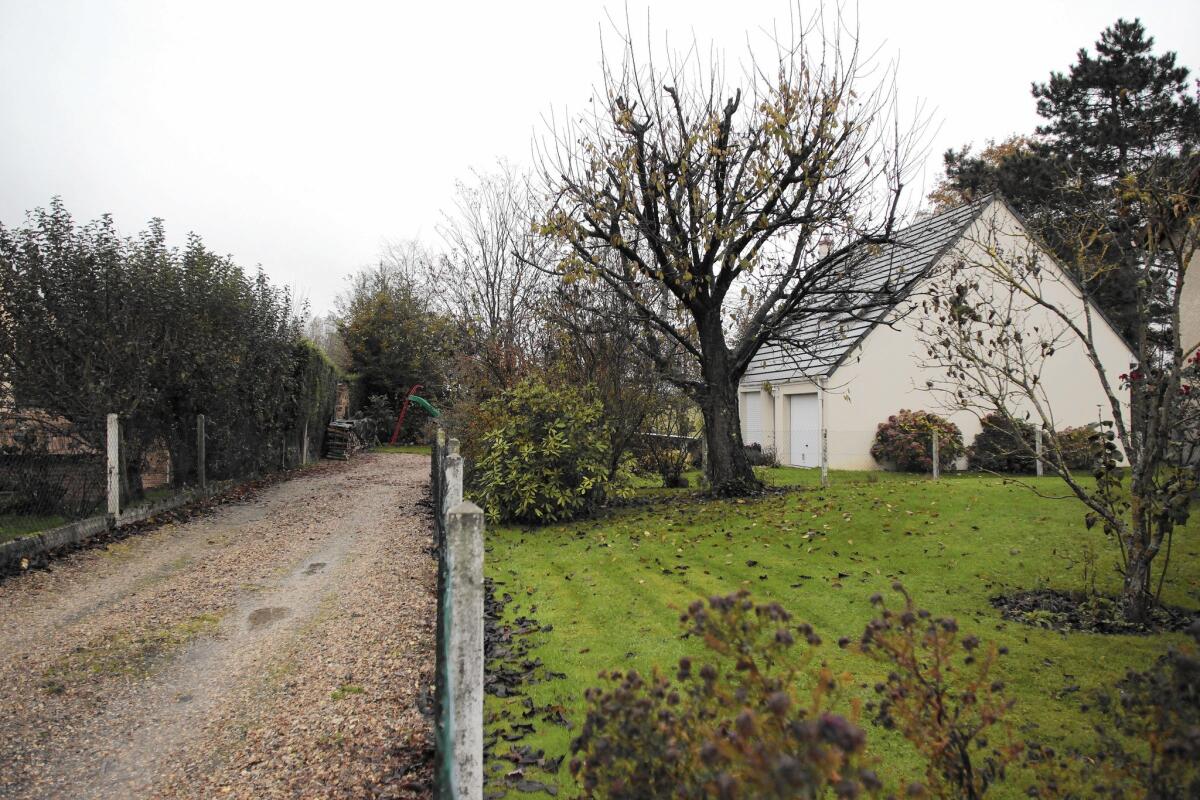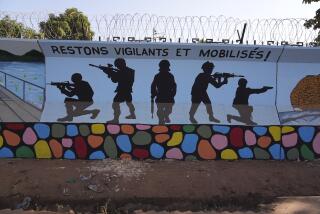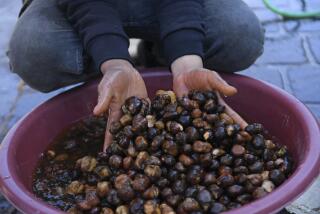French neighbors puzzle over Maxime Hauchard, accused in beheadings

The modest white stucco house set back from the road in this Normandy village near Rouen has been shuttered for more than a week.
“They’ve gone. We don’t know when they’ll be back,” said Rene Bret, a next-door neighbor.
Like everyone else in this village, he is shocked and puzzled by the allegation that 22-year-old Maxime Hauchard, who lived with his parents and younger sister in the house, is a knife-wielding terrorist. . Hauchard was identified by French authorities as one of the militants involved in the beheadings of American aid worker Peter Kassig and 18 Syrian military captives, shown in a video released Nov. 16 by Islamic State militants.
Bret, a retired truck driver, finds it hard to believe that the quiet former pizza delivery man could be the same person who is seen in the video picking up a knife and slitting the throat of a Syrian.
“He’s a good kid. He would never do that,” Bret said. “He organized a party a few years ago, and he held it in the field in the back so the noise wouldn’t bother us.”
Hauchard made no secret of his religious beliefs. He had converted to Islam at 17 after watching YouTube videos, he said in July during a television interview from Syria. He grew a beard, was sometimes seen in a long djellaba robe and attended a mosque in the nearby town of Elbeuf.
French police say that Hauchard was radicalized by Islamist recruiters on Facebook. In 2012, he traveled to the West African country of Mauritania but found that the religious education there was “not strict enough,” according to Paris prosecutor Francois Molins. In August 2013, posing as a humanitarian worker, Hauchard went to Syria via Turkey, according to police.
French investigators say there are 400 French nationals with Islamic State in Syria and Iraq, among the estimated 1,100 who have been in contact with the militant group.
The number of Islamic militants from France has been steadily increasing, said Molins, who described Hauchard as “far from an isolated case.” Islamic militants from Europe eclipse the 100 Americans who, according to the Congressional Research Service, are believed to be fighting with Islamic State and other groups in Syria.
Daniel Salat, a neighbor of the Hauchards who has lived on the street for 30 years, said the last time he saw Maxime Hauchard was when a friend came to get him. “We saw a guy who came to pick him up. That’s when he went to Mauritania,” he said, breaking off from washing his front garden gate.
The Hauchard family has lived in Bosc-Roger for about 20 years. Maxime’s mother, Noelle, works at a welfare office in Elbeuf. His father, Alain, is a maintenance worker. Maxime was educated at local schools before doing seasonal work in nearby towns. Employees at the Delice Pizza in Bourg-Achard remember that sometimes he would cycle the seven miles to work.
The Hauchard family was “well integrated” in the village, said Mayor Philippe Vanheule, whose son attended school with Maxime.
“If only every one of the 3,200 residents was like the parents,” Vanheule said in the modern annex of the village hall. Nearby are the village’s main stores, which include a supermarket, bakery, florist and a gift shop called Happy Home.
Many of residents work in Rouen, about 10 miles to the northeast; nearly a third are retired.
“We don’t have any youth problems,” Vanheule said. “The last time there was any trouble was about 10 years ago, when they went round smashing mailboxes.”
But one of Hauchard’s neighbors says the village has little to offer young people.
“They have nowhere to go,” said Elisabeth Marchand, a care worker who moved from Paris to Bosc-Roger with her husband nine years ago and lives two doors down from the Hauchards. “Youths here have no support. If you’re alone and isolated, maybe that’s an explanation” for what happened to Hauchard.
Marchand said it is difficult for outsiders to make friends in the village, where families keep to themselves. Despite living so close to the Hauchards, she said, they never spoke, “even when I was gardening.”
In Syria, Hauchard took the nom de guerre Abu Abdallah el Faransi. He told French news channel BFMTV that he wanted to help militants found an Islamic caliphate. He expected “martyrdom,” he said.
But Jean-Pierre Filiu, a professor and historian of Islam at Sciences Po university in Paris, challenged the religious narrative. He described Islamic State as a “cult” that cynically brutalizes its foreign recruits, then forces them to bring more into the fold via social media. Once in Syria or Iraq, the foreign fighters are used as a propaganda tool.
Filiu said Hauchard and others did not so much convert to radical Islam as reach a “tipping point” after being brainwashed. He noted that several Western hostages who were decapitated, including Kassig and his fellow American James Foley, were slain even though they became Muslims.
“Somebody who knows nothing about Islam is much easier to attract,” Filiu said, explaining that Islamic State recruiters contact “an isolated teenager sitting at his screen.”
Filiu was also critical of the media focus on the foreign fighters, which he said has provided Islamic State with “publicity they never dreamed of. These diabolical people have got us just where they want us.”
In Bosc-Roger, villagers expressed sympathy for Hauchard’s parents and his 17-year-old sister, who is still enrolled in high school. But Salat said he would not be surprised to hear of other such cases.
“If people don’t have a job, they’re ashamed,” he said, “and the next thing you know someone has come along to make them feel proud by bearing arms.”
Penketh is a special correspondent.
More to Read
Start your day right
Sign up for Essential California for news, features and recommendations from the L.A. Times and beyond in your inbox six days a week.
You may occasionally receive promotional content from the Los Angeles Times.






